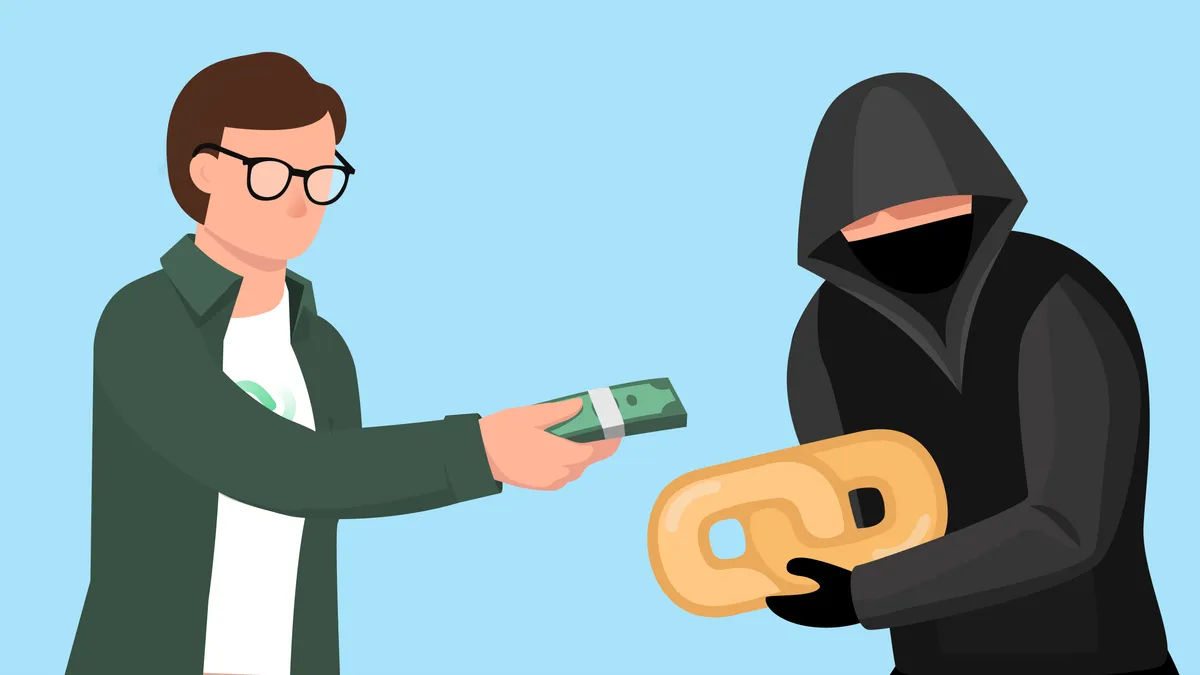
Should You Use Sponsored Links to Improve SEO?
Did you know that over 94% of online content gets zero backlinks, and only 2.2% earns links from more than one website?
In a world where backlinks are still one of the most important ranking factors on Google, those numbers should make you take notice.
There’s one specific type of backlink that tends to divide opinions: sponsored links. Are they helpful or harmful? Safe or spammy? Worth your budget, or best left alone?
In this guide, we’ll unpack what sponsored links are, how Google views them, and whether they can actually help your search engine marketing strategy.
What Are Sponsored Links?
Sponsored links, sometimes referred to as partner links, are hyperlinks that have been paid for. This happens either directly or indirectly as part of a promotional agreement between a website owner and a brand or individual.
They’re commonly used in online advertising, influencer marketing, and content sponsorship campaigns to prompt a specific web page, product, or service.
You can think of them like digital billboards placed on another website, but instead of just grabbing attention, they’re clickable and designed to drive traffic, awareness, and (hopefully) results.
🔗 How sponsored links work
Let’s say you’ve written an amazing guide on eCommerce search engine optimization (SEO) and you want to get it in front of more readers.
You might approach a popular marketing blog and pay them to include a contextual link to your article within one of their posts. Or, you could even sponsor a full article that includes a backlink to your site.
That outbound link from their site to yours is a sponsored link.
🔗 Where you’ll typically find sponsored links
Sponsored links can appear in a variety of formats across the web. Here are some of the most common:
Sponsored blog posts: Articles written for or by a brand in exchange for a fee, often featuring a backlink to the brand’s website.
Below is an article on the New York Times website that has been paid for and includes a sponsored link:
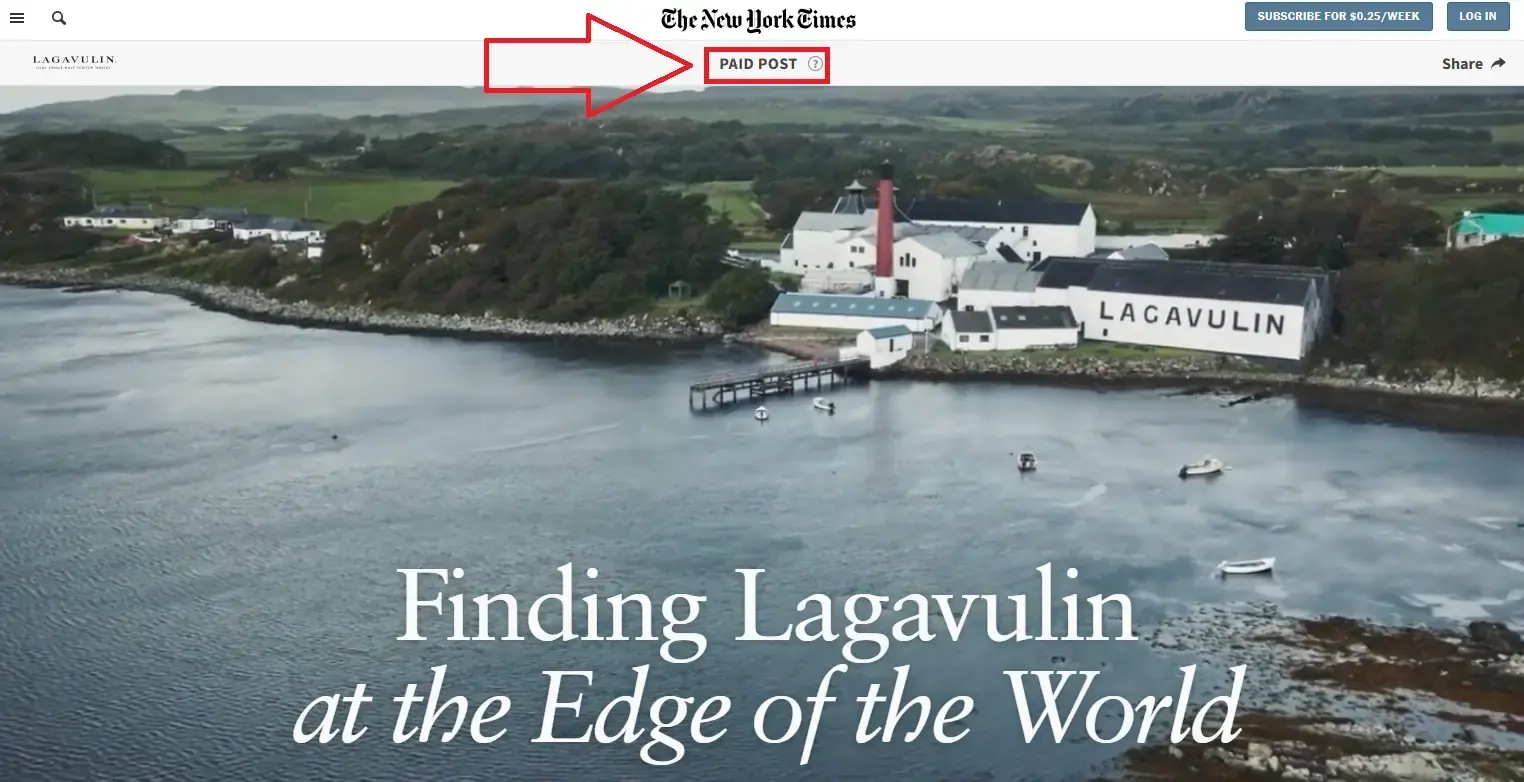
Banner ads or native ads: Graphical or embedded text-based ads that link to an advertiser’s site.
Here you can see banner and native ads on a website that are being paid for by the brands who are advertising:
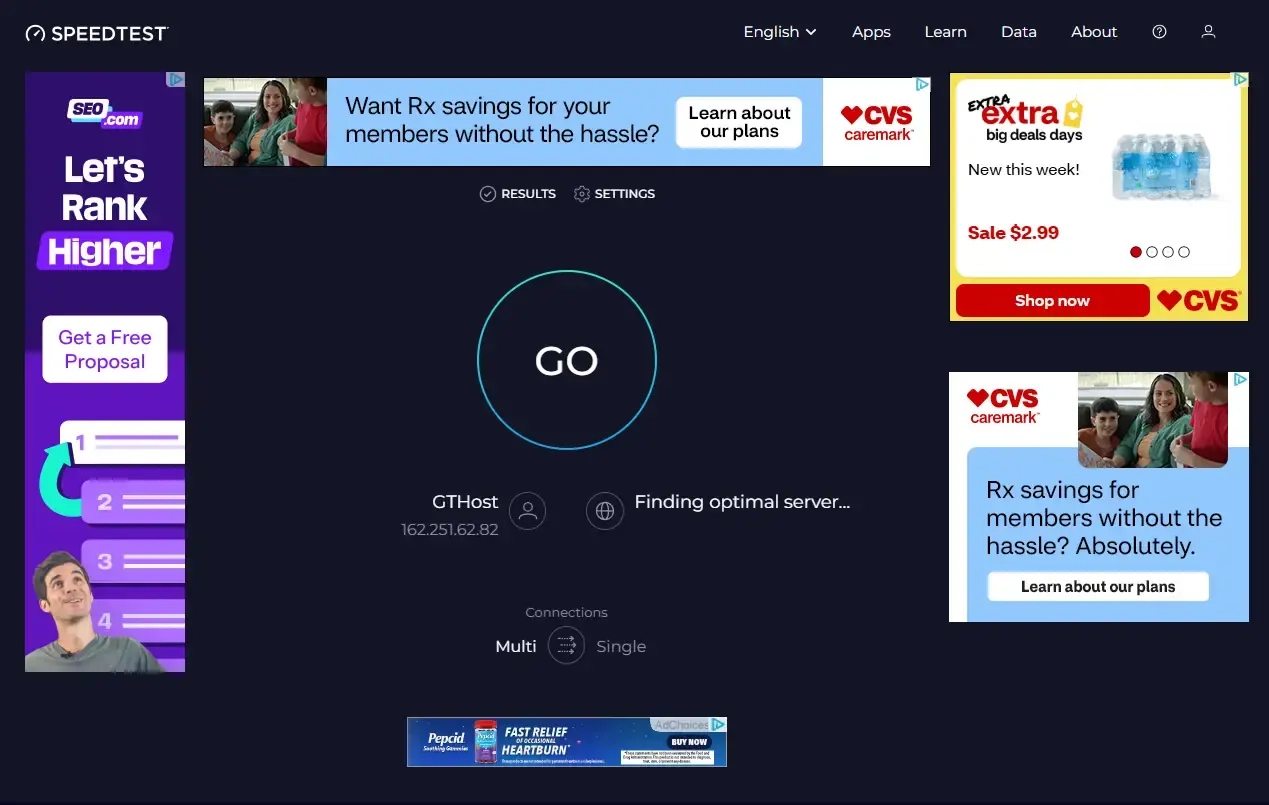
Affiliate links: Although technically a bit different, some affiliate links may also be marked as sponsored to clarify the commercial nature of the relationship.
This blog article contains affiliate links to the products it mentions:
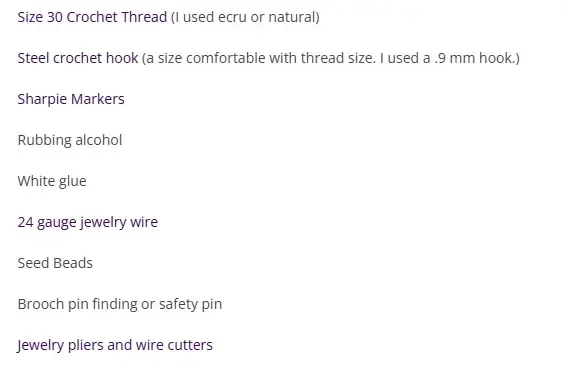
Directory listings or resource pages: Paid placements in niche directories or “top tool” roundups that include a backlink as part of a package.
The entry below on this resource page that includes a backlink could have been paid for by the brand being promoted:
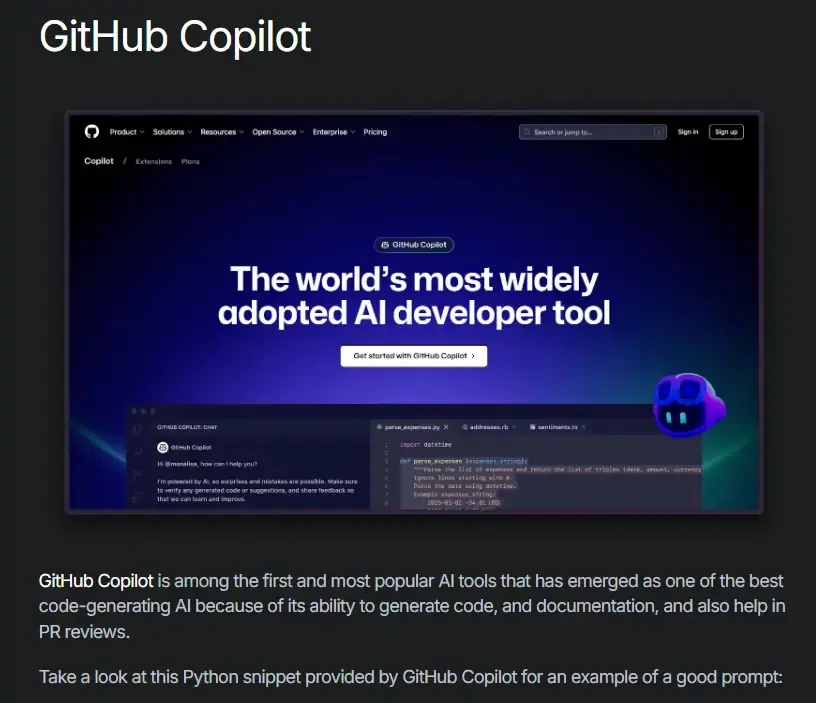
🔗 Are sponsored links the same as Google Ads?
It’s easy to confuse sponsored links with Google Ads. After all, they’re both forms of online advertising that involve paying for visibility.
But while the two may serve similar goals (like helping you attract qualified visitors and gain brand exposure), they operate in different ways.
Sponsored links: Paid placement on third-party websites
As discussed above, sponsored links are backlinks you pay for on someone else’s website that point to your own website or landing page.
You negotiate the placement with the site owner or through an agency. They’re about placement within content that already exists (or is created) on the publisher’s site, outside of Google’s own ecosystem.
Google Ads: Paid advertisement on the Google Search Network
On the other hand, Google Ads operates within Google’s own platform. When you create a paid campaign, you’re bidding for ad space on the Google Search Network, which includes Google’s search results pages, partner sites, YouTube, and more.
Your ad appears as a paid advertisement above or below the organic search results, usually marked with a “Sponsored” or “Ad” label, as you can see in the examples below:
Behind the scenes, your visibility depends on Google’s sponsored links auction, which determines which ads appear based on your bid amount, keyword relevance, and something called your Quality Score.
If your Quality Score is high, you’ll pay less per click and your ads will show more often, making your online marketing efforts more cost-effective.
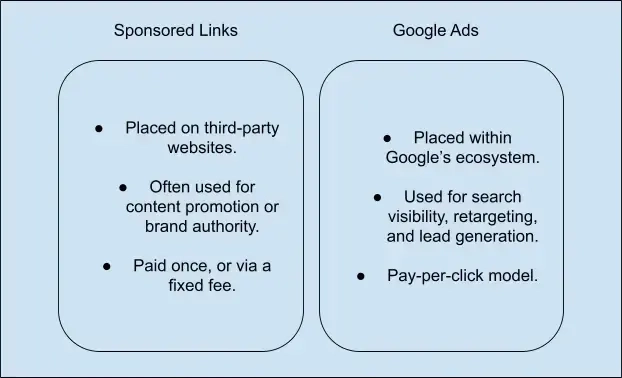
A Quick Trip Back in Time: How the Sponsored Links Tag Came About
It’s important to understand how sponsored links came about before you consider paying for them.
When marketers first started outsourcing SEO, many of those services realized that they could gain effective links by:
Adding spam comments to a blog post.
Placing links on websites that allow user-generated content.
Google then introduced the “nofollow” attribute to help combat this type of comment spam in 2005.
Compared to dofollow links, nofollow links signal to search engines that they should ignore the link and not attribute any PageRank to it.
💡 What Is PageRank?
PageRank is Google’s algorithm for measuring the importance of a web page based on the quantity and quality of links pointing to it. The more high-quality sites that link to your page, the more authority it gains in Google’s eyes.
Nofollow links mean that the destination URL doesn’t get a boost in its search engine rankings.
This was a welcome change because it prevented Google from indexing and crawling untrustworthy links that webmasters didn’t want to be associated with their site.
However, this update categorized all paid links as “nofollow,” which meant that search engines couldn’t separate advertising links from untrustworthy ones.
Introducing the Sponsored Link Attribute
This is why Google announced that in 2019, the “nofollow” attribute would receive two important additions: the sponsored and “UGC” attributes.
The UGC attribute was designed to help Google identify links generated by users. This includes links to articles or blog comments, as well as those created in forum posts.
These new attributes allowed search engines to provide better clarity over a link’s intent and category, instead of marking them all as “nofollow” links that should be ignored.
💡Here’s How Webmasters Show Which Link Attributes They’re Using:
💡Here’s How Webmasters Show Which Link Attributes They’re Using:
1️⃣ “Nofollow” links: rel="nofollow"
2️⃣ Sponsored links: rel=“sponsored”
3️⃣ User-generated links: rel=“ugc”
How Do Sponsored Links Affect Link Building?
Although they were not used for crawling and indexing before, Google’s update in 2020 indicated that “nofollow,” "sponsored", and UGC links would be used as a “hint” going forward.
While sponsored links may be crawled, they are not a direct ranking factor and will not significantly affect a web page's SEO rankings.
Not only does the rel=“sponsored” tag show Google’s algorithm that you paid for the content, but it also prevents the post from passing on any link juice to your site.
But Google does indicate that it provides a "hint," so there may still be some benefit to earning links with the sponsored tag from high-profile websites.
What is link juice?
Link juice, also known as link equity, is the name given to the value or authority a page passes on when it links to another page.
Sponsored Link Example
We recently decided to pay for an advertorial on a popular SEO blog, promoting our link-building services, which you can see below.
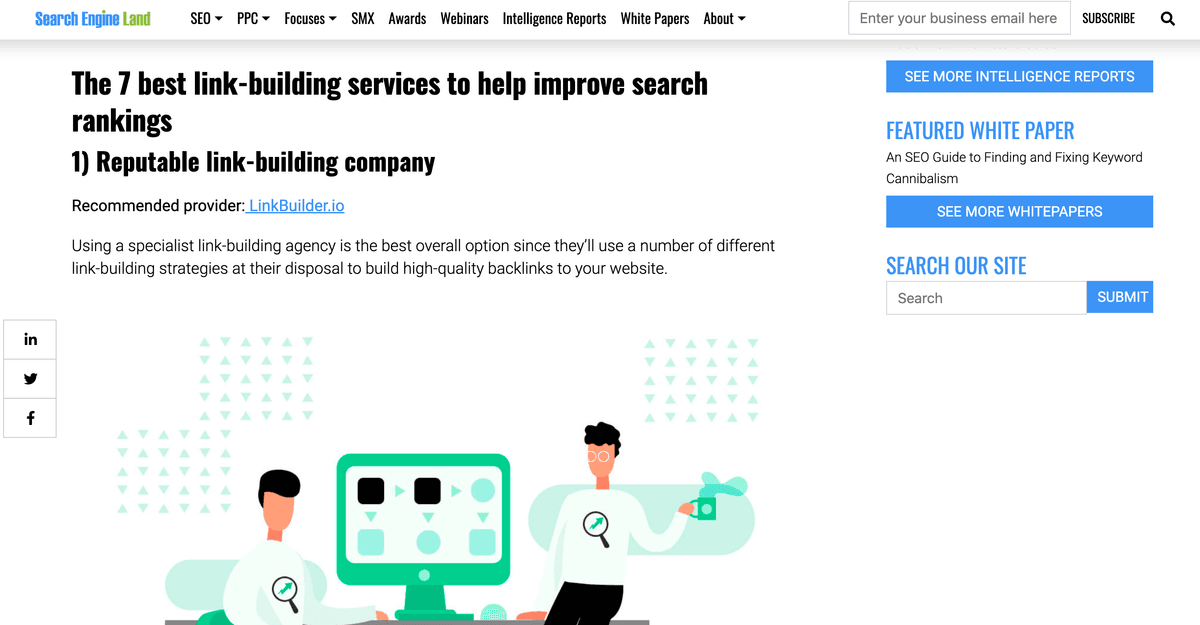
However, the website in question made it clear to us that all outbound links would include the rel="sponsored" tag, which means that any SEO benefit from having this link was mostly nullified.
Below, you can see how they added this to the outbound link pointing to our website.
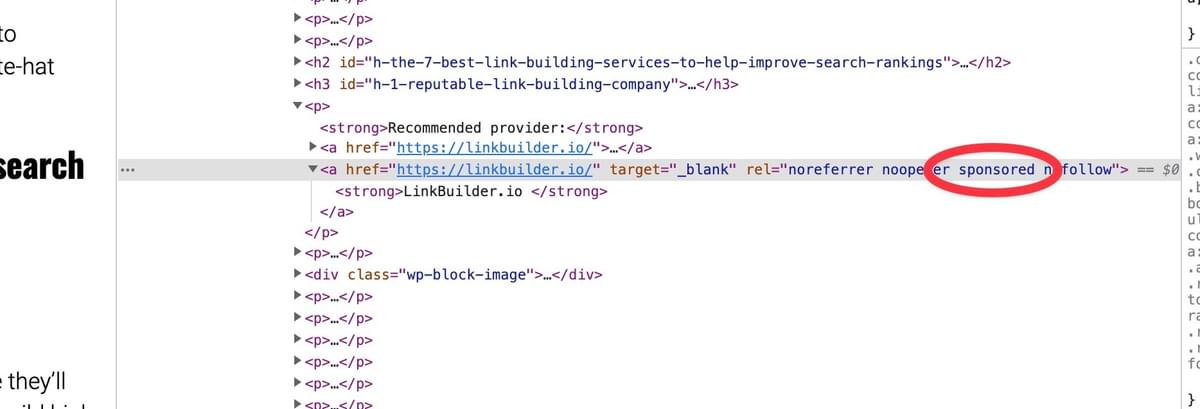
In a situation like this, we don't care that the website in question added the sponsored tag. We didn't buy this sponsored post for the power of the backlink; we did it because of the referral traffic it generates for our business.
Hundreds of companies do the exact same thing every day!
If you Google "NYTimes + Paid Post," you'll see countless examples of brands that have paid for featured placements in the New York Times:
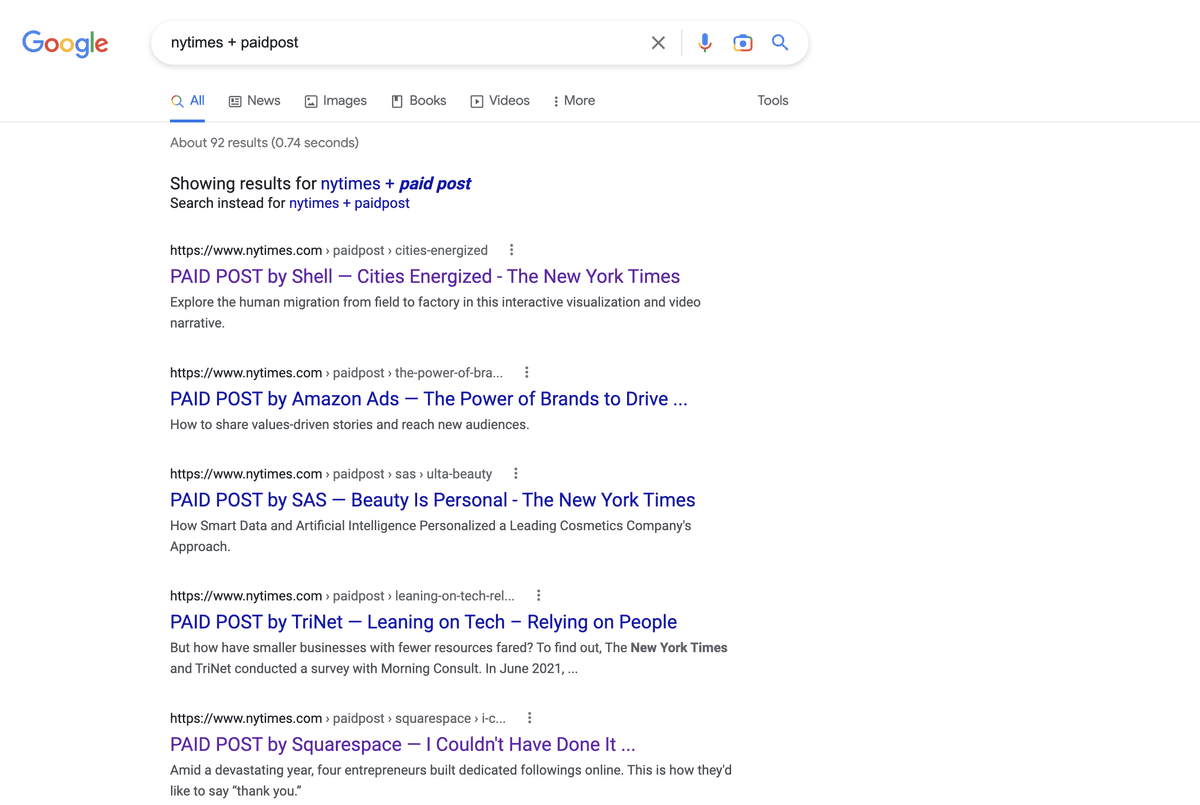
Want to know the funniest part?
The New York Times does not add rel="sponsored" tags to the outbound links on its sponsored posts!
This means if you have the budget and are willing to pay for a sponsored article on the New York Times, chances are that a backlink from them to your website will carry a ton of weight and authority.
Many people in SEO do this kind of thing, and nowadays, Google and other search engines have seemingly given up on punishing people for buying links, according to SEO Chatter.
Will I Get Penalized for Using Sponsored Links?
You won’t get penalized for using sponsored links. Google introduced the sponsored link tag to prevent penalties and allow for the 'legitimate' purchase of paid links on third-party websites.
So, Google is essentially saying that if you're paying for a link or advert on another website, then you must use this sponsored tag.
Google’s Search Essentials (formerly Webmaster Guidelines) states that buying links for ranking purposes is considered manipulative:
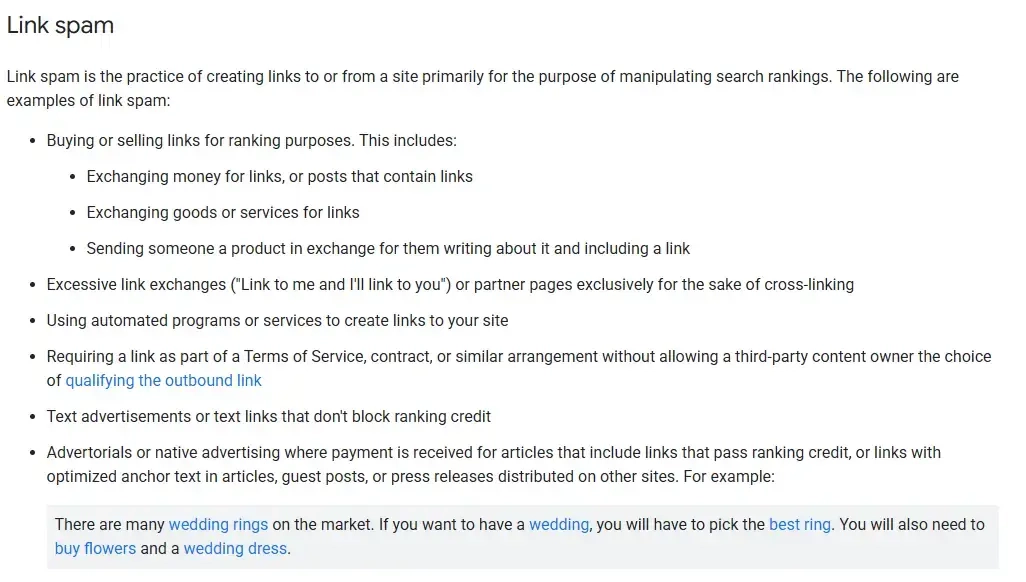
But Google also recognizes that not all paid links violate its guidelines. When it's done for advertising purposes and not to manipulate search results, webmasters can avoid penalties.
This is why it’s best practice to include the rel=“sponsored” or “rel=“nofollow” tags when publishing sponsored links.
This gives Google absolute clarity over what your sponsored links are used for and will ensure you don’t pass any link juice to a site that’s incentivizing you to link to them.
Should I Use the Sponsored Links Tab?
The truth is, most websites and SEO practitioners buy backlinks all the time. The problem with including a sponsored tag in any link you purchase is that the link automatically becomes devalued.
For this reason, most SEOs don't want the website they're publishing on or paying to include a rel="sponsored" post. As we've already explained, Google mostly disqualifies any such links from its ranking factors.
Our advice is to leave it to the discretion of the website you're getting a link from. As we've already seen, the vast majority of publishers (including the New York Times) won't even bother adding a sponsored tag to outbound links.
Nine times out of 10, they won't add that tag, so you'll still get the full benefit of the backlink.
What Do Sponsored Links Cost?
Sponsored links can vary widely in price, ranging anywhere from $500 to over $5,000 per placement. But the cost of sponsored links depends on several key factors that influence the value of the link, the potential reach of the content, and how desirable the publishing site is.
Let’s break down what you’re actually paying for:
➡️ Domain authority (DA) and website metrics
The higher the website's domain rating (DR) or domain authority (DA), the more expensive a sponsored link tends to be. This is because sites with strong backlink profiles and high trust scores in Google’s eyes are more influential and in demand.
➡️ Relevance and niche
The more relevant a site is to your business or product, the more value the link has. But it’s also potentially more expensive.
For example, if you’re a SaaS company targeting eCommerce brands, getting a sponsored link on a highly specific e-commerce marketing blog is going to cost more than a generic business site.
That’s because targeted audiences are harder to reach and more likely to attract qualified visitors.
➡️ Type of content
Are you paying for a simple link insertion into an existing article? Or commissioning a full sponsored blog post written just about your brand?
Link insertions typically cost less because the work involved is minimal. Custom content placements, especially if the publisher creates, edits, and promotes the content, can push prices much higher.
➡️ Traffic volume and audience size
Websites with higher traffic and larger audiences can ask for premium pricing. If a site brings in hundreds of thousands of monthly visitors and ranks for competitive keywords, your sponsored link has a better chance of driving referral traffic.
Best Practices for Sponsored Links
To get the most value out of your sponsored links without wasting budget or damaging your brand, keep these best practices in mind:
Choose relevant websites and real audiences: Make sure the site’s content aligns with your niche and attracts actual, engaged readers, not just inflated traffic stats.
Check the site’s traffic and engagement metrics: Use tools like Ahrefs or SimilarWeb to evaluate monthly visitors, bounce rates, and traffic sources.
Look for editorial-quality content: Avoid sites filled with low-effort, keyword-stuffed posts. Well-written content signals higher trust and a better user experience.
Prioritize contextual placements: Links perform best when embedded naturally within relevant, high-quality content, preferably surrounded by useful information.
Negotiate for long-term placement: Ensure your sponsored link won’t disappear in a few months. Some publishers remove old links or archive posts, so be sure to confirm how long your placement will remain live.
Avoid link farms and spammy networks: If a site exists solely to sell links, steer clear. These sites are more likely to be devalued by search engines.
Navigate Sponsored Links Safely with LinkBuilder
Sponsored links can be powerful, but only when used with care. From staying compliant with Google’s guidelines to making sure you’re actually getting value for your money, there’s a lot to consider before handing over a budget for paid placements.
At LinkBuilder, we understand the nuance. Our expert team vets every opportunity, focusing on quality, relevance, and transparency. No shady tactics, no spammy sites. Just smart, ethical link building that supports your goals.
If you’re looking to explore sponsored links without risking penalties or wasted spend, we can help guide the way. Feel free to contact us, and let’s talk about how you can make backlinks work for your SEO strategy.

